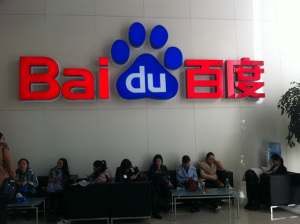Baidu Fighting Regulatory Challenges
Baidu (NASDAQ: BIDU) has been struggling in recent quarters due to regulatory pressure. The company, however, has been moving beyond search to other areas like online video and autonomous cars, and its latest venture is into Augmented Reality (AR).
Baidu’s Financials
Baidu’s second quarter revenues grew 10.2% over the year to RMB 18.26 billion (~$2.75 billion), missing the market’s forecast of $2.99 billion. Net income declined 34.1% to RMB2.414 billion ($363.2 million. Non GAAP EPS of $1.22 was however ahead of the market’s forecast of $1.15 for the quarter.
The decline in profit was caused by increased scrutiny and stringent regulations in healthcare and related ads and the reduced number of sponsored links across Baidu’s platform.
By segment, revenues from Online Marketing Services grew 4.4% over the year to RMB 16.94 billion (~$2.55 billion). Active online marketing customers grew 0.7% to 594,000. Revenue per online marketing customer grew 3.6% over the year to RMB 28,400 (~$4,273). Revenues from Other Services grew 271% to RMB 1.3 billion (~$0.2 billion).
Among operating metrics, mobile search monthly active users (MAUs) grew 6% over the year to 667 million. Mobile maps MAUs grew 13% to 343 million. Gross merchandise value for transaction services grew 166% over the year to RMB 18.0 billion (~$2.7 billion) and Baidu Wallet activated accounts grew 131% to 80 million at the end of the quarter.
For the third quarter, Baidu expects revenues of RMB 18.04 billion-18.58 billion (~$2.7-$2.8 billion), representing a y-o-y decrease of 1.9% to 1.1%. Analysts estimate revenues of RMB 19.93 billion (~$3 billion). During the earnings call, the CEO Robin Li said that the implementation of new regulations and their own stricter standards are likely to suppress revenue for the next two to three quarters.
The new rules will be effective from August and will be prohibiting search engines operating in China to display banned information in various formats including links, summaries, cached pages, associative words, related searches, and relevant recommendations. Additionally, the engines will now be required to report websites and applications that contain prohibited content when spotted. Baidu will now restrict the number of sponsored posts to 30% of a results page and also establish a RMB 1 billion (~$0.15 billion) fund dedicated to fighting fraudulent representations.
Beyond Search
Last month, a $2.3 billion bid for buying Baidu’s video platform iQiyi was abandoned. In February, a consortium including Baidu CEO Li and video site iQiyi.com CEO Yu Gong had offered to acquire iQiyi, but investors termed the bid as being too low. iQiyi had 10 million paying subscribers in 2015 and more than 20 million paying subscribers in June 2016. Shanghai market-research firm 86Research expects China’s online video advertising market to reach 53 billion yuan ($7.93 billion) by 2018, and it values iQiyi at $5.8 billion. Analysts believe the $2.3 billion offer barely covers Baidu’s investment in the video unit.
This week, Baidu unveiled an AR platform called DuSee that will allow China’s mobile users to test out smartphone augmented reality on their existing devices. The platform would be integrated into its biggest apps including its mobile search engine.
Its stock is currently trading at $162.24 with a market capitalization of $56.23 billion. It touched a 52-week high of $217.97 in November last year. It had fallen to a 52-week low of $100 in August last year.
Photo credit: Jon Russell /Flickr.com
Featured Videos
Can 1M/1M Help Me Raise Money?
How Does 1M/1M Democratize Entrepreneurship Education?
How Does 1M/1M Democratize Management Consulting?
When Is The Right Time To Join 1M/1M?
Can 1M/1M Help Me With Business Development?
Can 1M/1M Help Me With Market Sizing?
Can 1M/1M Help Me Validate My Product?
Will I Have Private 1-on-1 Sessions In 1M/1M?
How Does 1M/1M Help Entrepreneurs Connect With Silicon Valley?
Mentoring or Consulting?
Why Does 1M/1M Charge $1000 a Year?
Why Does 1M/1M Partner With Local Organizations?
Why Don\’t Mentoring Networks Work?
Why Is It Important To Study With 1M/1M Now?
Dan Stewart Story
Vikrant Mathur Story

